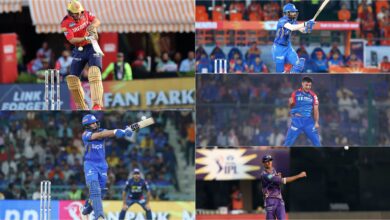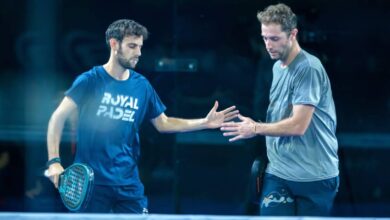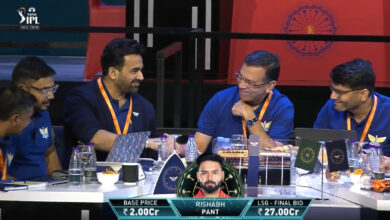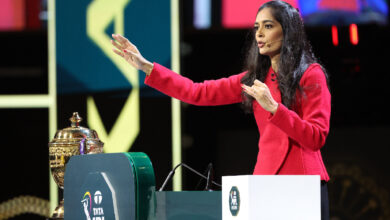Abhinav Bindra: ‘Hosting Olympics is not about just two weeks, it’s about a higher level of achievement’ | Sport-others News

IOC Athletes Commission member Abhinav Bindra on what hosting the Olympics could mean for India, engaging with the younger demographic, grooming talent through robust organisations and the growing self-belief of Indian athletes. The session was moderated Senior Assant Editor Mihir Vasavda.Mihir Vasavda: What did India achieve hosting the International Olympic Committee (IOC) session?
This IOC session was one of the best organised and credit goes to Mrs (Nita) Ambani, chairperson, Reliance Foundation, that it was flawless in every respect. What it has managed to achieve is to showcase our potential not just in sport but the overall development that’s happening in the country. It’s both in the interest of the IOC and our country to engage with the Olympic movement. First, from the IOC’s side, it is an opportunity to engage with the world’s largest and youngest population. It is a market, a country where the IOC has been trying for many years to really make its presence felt in a meaningful way. The wheels are slowly starting to turn there.
Of course, India is starting to embrace Olympic sports at the level it never has in terms of supporting athletes; all credit goes to the government for prioritising sports. We are slowly starting to see results also come through.
Mihir Vasavda: What is spurring the recent surge in terms of results?
It has got to do with the people. Our young demographic is driving demand, not just in terms of watching sport but also playing at a community, club and elite level. When that happens, sport becomes a priority for governments as well because at the end of the day, at a political level, you are trying to appease a young audience. When sport is an important aspect in the life of every young Indian, it’s only natural that there will be more investment going into it.
There were many fantastic medals (at Asian Games). Watching that table tennis medal come was interesting; watching a lot of our shooters win with world record scores was spectacular
At the elite level, Indian athletes are very well taken care of. You cannot compare the kind of investment that’s happening in a lot of sports with anywhere else in the world. What we are also starting to see slowly is more investment permeating down to the grassroots level, like the Khelo India and other programmes.
Of course, it’s never going to be perfect from day one and there’s more work to be done to improve grassroots athlete development.
Mihir Vasavda: If you had to choose between spending tens of billions on the Olympics and a fraction of that on training, infrastructure and exposure, what would you choose?
It’s difficult to choose one or the other. While they are similar, they are also different. When you are hosting the Olympic Games, it’s not about those two weeks. What you are trying to achieve at a larger level needs to be considered. How the Olympic Games can act as a catalyst for the development of your country. So you have to see it from that prism.
Development of athletes is a long-term process and it has to happen in tandem. If you are the host, you’d like a strong performance from your athletes. Our performances are certainly improving. When our Asian Games slogan — Ab ki Baar, 100 Paar — came out, whoever I spoke to laughed it off. But it happened, right? We won a 100 medals.
If you look at Western countries, all the developed sports nations have very few athletes who just play sport all day… We have to go in this direction. Basic education for our athletes is important
Now it will be interesting to see how the performances at the continental level translate at the Olympic level. It’s a completely different story there. A lot of events that are at the Asian Games will not feature at the Olympics. So that sort of a medal tally is not going to happen. But are we going to make an improvement from the seven medals we won last time around and go into double digits?
Shivani Naik: What are your views on the type of sports that should be in the Olympics?
What is very important for sport in the Olympics is to remain relevant to youth. What the Games and IOC have done well is to stay in touch with the times. The five sports chosen in Mumbai are a combined decision of local hosts and there are many considerations that they make. Los Angeles wants to make their Games work and make sure they are financially sustainable. So the inclusion of cricket, with a fan following of 2.5 billion people, was an important consideration. The Games will always remain dynamic and it is a reminder to many traditional sports to keep their game up and ensure they remain relevant to the youth.
Shivani Naik: China ushered in teenage shooting champs, India is on the same path. Is it game over for anyone above 23 or do experience and maturity still matter?
The sport of shooting is becoming younger in nature, at least in certain disciplines. Specifically rifle and pol sections. A lot of that has perhaps got to do with changes in rules in the recent past. The scores shot in today’s day and age are much higher than when I shot. That’s attributed to the better quality of athletes and also rule changes in the last few years in allowing certain adjustments with the rifle, which have really changed the dynamics of athletes. Decimal scoring was introduced towards the end of my career but now we are seeing a new generation of athletes competing under those sets of rules. It is a much more aggressive form of sport. Besides reaction time has a big impact on decimal scoring. So younger athletes are really coming up. These are a few elements to be considered. There are certain events where experience would continue to matter, shotgun or outdoor events like 3-Position.
Shivani Naik: As a spectator, what is the sport you like watching the most at these global competitions? And can you pick a favourite medal from the 2023 Asian Games?
It’s difficult to pick a favourite medal. There were a lot of fantastic medals. Watching that table tennis medal come was interesting; watching a lot of our shooters win with world record scores was spectacular. I enjoy a variety of sports. I’m looking forward to breaking at Paris 2024, I’m a big fan of it. I didn’t think much of it as a sport until I actually saw it at the Youth Olympics in Argentina. I was completely blown away it. I am looking forward to climbing, I think it’s quite interesting. I love what archery did. It’s a sport that has done pretty well to remain extremely relevant in terms of their broadcast. My sport (shooting) needs to take inspiration from archery.
Nihal Koshie: For a country like India, which is still a developing country, do you think it’s wise to host the Olympics?
It depends on the sort of project that India comes up with. That’s yet to be ascertained. At least I’m not privy to the information needed to make an informed comment. We have a region being talked about to host but we don’t know if it’s final. First, we need to finalise that, if it’s one region or multiple.
It all depends on the legacy planning that goes around this project. You have to consider there are two costs: one is the operational expenses for hosting the Olympics and the other is the developmental costs that a city undertakes as a legacy of the Games, whether that be building an airport or public transport or other basic infrastructure. These expenses are usually maken as operational costs for the Olympics. So you have to consider two different budgets. Let’s give it a chance. Let’s see what the Government and the IOA (Indian Olympic Association) come up with eventually.
Nihal Koshie: A few years back, you had said that India shouldn’t host a mega event like the Olympics unless we are capable of winning 40 medals. 2036 is a few years away but do you think that progression will happen?
If we have to host an Olympics, no one will disagree with what I have said. We want a strong performance from our athletes. Forty medals in 2036 is a fair ask for what we’re doing! We should aim for that. No question about it. It really boils down to how we as a nation are going to embrace sport. Can we embrace sport as a catalyst to build our society into a healthier and more inclusive one? Can we use sport to educate our young kids? Then of course hosting the Olympics is an interesting thing to do. It can act as a catalyst for so much development. What I would not like to see is us embracing sport from just one prism: winning medals. The role of sport is much larger.
Amit Kamath: Do athletes now need to be more socially, politically aware and should they be open to putting their opinions out there?
There is no one-size-fits-all. We are all unique individuals. We have different personalities and we have different comfort levels. This is something very individualic and I think I cannot say this way or that way. It depends on one’s comfort level. As athletes, we are in sports and we are driven certain values and values associated with sport. So what I would like to see is all our athletes remaining true to the values. If athletes themselves are not ambassadors of those values, then it’s a slippery slope. We need to have role models. We need to have athletes who stand for certain values. If you want athletes to be more outspoken or express themselves more, that is very individualic. You can’t tutor somebody to be a certain way.
Amit Kamath: Your gold medal in 2008 and Neeraj Chopra’s gold medal, could you contrast the impact these gold medals had on the Indian sporting ecosystem?
I would like to imagine my gold medal had an impact on my sport. You’ve definitely seen more participation in shooting and the depth of talent in India that exs is incredible. Maybe only China has that much depth. Investment in the sport has increased. Awareness about the Olympic movement has increased.
Neeraj’s gold medal had a massive impact on athletics and the perception of Olympic sports in general. What we’re starting to see is the impact it’s having on his own event. The Asian Games are a clear indication of that. Once one person breaks the glass ceiling, you have many more believing it’s possible.
Amit Kamath: Do you see that the mindset of Indian athletes is now changing?
For sure. There are two levels. One is in sport and that I had already started to see even when I was competing. There was much more belief. They were not content with just competing. What we’re also seeing is a societal shift. A person of the current generation just has more belief. They believe that they are going to be the best. That is building a more confident society and we are also seeing with our athletes. They go out on the field of play with a greater degree of self-belief and confidence. So when I was competing, you know, I only had self-doubt, I never had any degree of confidence. Today, it’s a different mindset.
Tushar Bhaduri: Do you think the autonomy of the Indian Olympic Association and other sports bodies is coming under threat with government appointees being at the helm on some pretext or the other?
I don’t know the specifics. But what I would like to say is that the autonomy of sport is something which is very, very important. And that is why it is so important to build robust organisations. What we’ve seen horically in our organisations is that it has been very dependent on individuals; you have a face, you have one person and we’ve not really seen the development of making these organisations structurally robust. And I like to see that development happen because it is absolutely critical for Indian sports to have them governed in the highest quality, having autonomy at the heart and centre.
Tushar Bhaduri: What do you think is the logic behind rewarding Indian athletes who win medals at international competitions, say presenting someone Rs 1 crore for an Asian Games silver medal? Do you think we sometimes lose perspective in these matters?
We will see how things develop. Once we start to win 50 medals at the Olympic Games, maybe there will be a rejig of this policy. Right now, we are giving away all this money because may be we don’t win so much. I will never say this is illogical. At the end of the day, the medals will not bring food to the table. The athletes also need to be financially independent and need to be financially secure to lead their lives. And in our current system, how sport is structured, the real possibility of income for an athlete is through these awards and rewards.
So I’m not going to say anything against them. What I would like to say, which may be a more meaningful thing to brainstorm here, is as we develop sport in India, as many more young Indians start to play sport at the elite level, we need to focus on dual careers in sport. If you look at all the Western countries, all the developed sports nations have very few athletes who just play sport all day. The majority of them end up having an education, many of them have actual jobs and then they also play sport. We have to slowly start to go in this direction. Basic education for our athletes is very important. Skilling them up for life after sport is very, very important.
Vinayakk Mohanarangan: You worked with a lot of athletes across age groups post your playing career. What is the most rewarding aspect of working with younger athletes?Most Read
1
India vs England, World Cup 2023 Highlights: Mohammed Shami takes 4 while Jasprit Bumrah takes 3 as IND defeat ENG 100 runs
2
Deepika Padukone kept the promise she made to mehendi art Veena Nagda in 2013: ‘She stuck to her words…’
See More
The work that I do through my foundation is my primary outreach to sport in India. We are doing work in different fields with young athletes – that’s one element of the work we do. We work a certain amount in interesting projects like providing 100 free surgeries to athletes during the year. These are athletes that you and I wouldn’t even have heard of because they are from the grassroots. Sometimes at that level, they have no access or knowledge to go and get themselves rehabilitated.
So last year we did 70-odd surgeries and helped these athletes come back to sport. We also help them psychologically since injuries aren’t just about the physical aspect. Our scholarship programme is called STEAM (Science Technology Engineer and Analytics in Medicine). We currently give scholarships to 220-odd athletes. Many athletes you may not have heard of now but hopefully you will hear more of them in the future.
And finally, I’m working with the Olympic value education programme and that to me is the most meaningful — Using the power of sport to take it to communities and build characters through the medium of sport.







